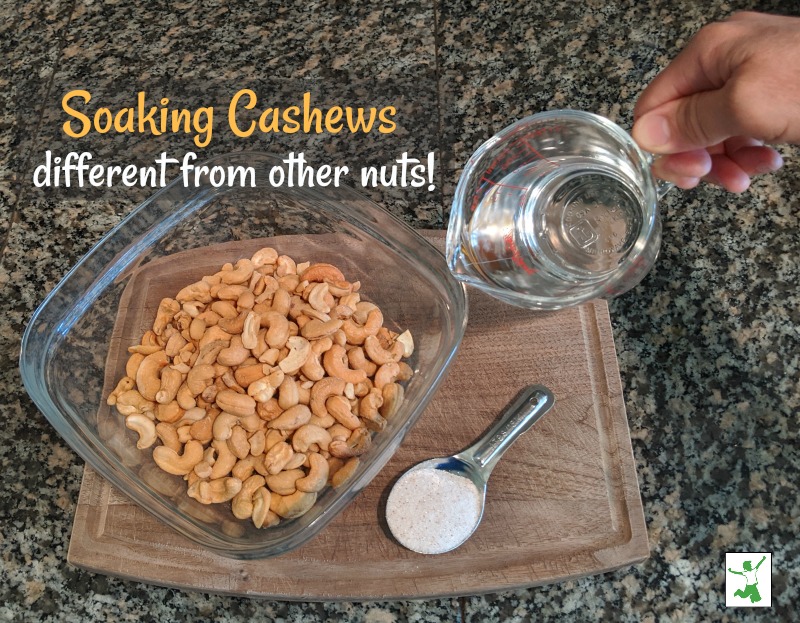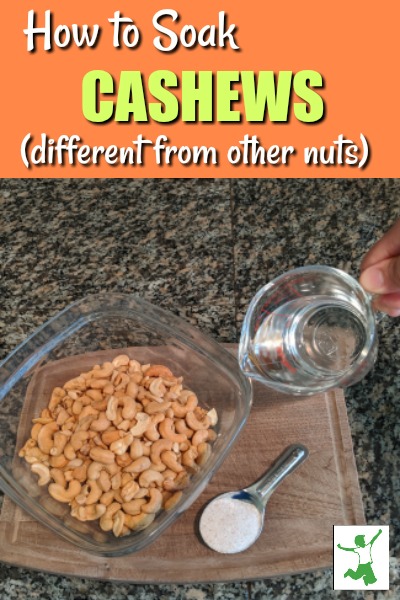Soaking cashews to improve nutrition and digestibility is important. It is quite a different process from other nuts, so take note of the steps so you don’t ruin a batch.

Learning how to soak nuts is very important to improve digestibility and nutrient absorption.
While raw nuts are an extremely nutritious food, this careful preparation is key in order to unlock the maximum absorption potential.
This is because raw nuts are a type of seed, and seeds are most nutritious if they are soaked. This is because they contain anti-nutrients such as phytic acid and lectins that can prevent all that wonderful nutrition from being digested thoroughly. These inhibitors can also cause digestive distress if many raw nuts are consumed on a regular basis.
For some people, even a few raw nuts cause digestive distress. Sometimes, eating plain raw nuts can cause a rash around the mouth. Barring a life-threatening nut allergy, soaked nuts generally present no problems for these same people.
My husband, for example, can’t eat raw nuts. If I soak and low temperature dry them either in a warm oven or dehydrator, however, he can eat and enjoy them without any problems.
Soaked Cashews. A Whole Different Process!
The soaking process and low temp dehydration, which maintains rawness, is in accordance with the wisdom of Traditional Cultures. (1)
That said, cashews are a whole different process!
And, cashews are very expensive, especially if you choose to buy organic. So, you want to be sure you do it right so you don’t accidentally ruin a batch.
Raw Cashews Aren’t Really Raw
The problem is a result of the mislabeling of cashews.
Cashews labeled “raw” aren’t really raw at all. In fact, cashews already undergo two separate heat treatments before reaching store shelves either in bulk bins or sealed bags or containers.
The reason manufacturers heat treat them before shipping to stores is because they contain a toxic oil called cardol. This substance is located between the inner and outer shell.
Cardol is released by cracking the cashew and roasting them at 350 °F (177 °C). Then, nut manufacturers crack and roast them again.
After these two treatments, the cashews are packaged and marketed as “raw”. (2)
This processing predisposes cashews to mold quickly if soaked in salted water for 8 hours or overnight, which is appropriate for truly raw nuts.
Even if you don’t get mold, soaking cashews overnight will likely produce a slimy texture and unpleasant taste when they are dried.
I can’t tell you how many people I know who tried soaking nuts for the first time with cashews, soaked them overnight, ruined them and never tried soaking again. ?
How to Soak Cashews (5 steps)
Because “raw” cashews aren’t really raw at all, you have to approach soaking in a completely different way.
The first important difference is to never soak cashews for more than a few hours. In my experience, even the 6 hours as recommended by Nourishing Traditions Cookbook is too long. It has resulted in slimy cashews for me every single time I’ve tried it.
Perhaps it’s because I live in a warm, humid climate most of the year. If you live in a cooler clime, perhaps you can get away with soaking them for a full 6 hours.
My method for soaking cashews which has never resulted in slimy cashews or an otherwise ruined batch is as follows:
- Place whole cashews in a large glass bowl.
- Add enough filtered water to cover (vetted water systems to consider).
- Mix in 1/2 teaspoon of sea salt for every cup of cashews.
- Soak uncovered for 3 hours and then promptly drain.
- Spread on cookie sheets and thoroughly dry in a 250 °F (121 °C) oven. Check and turn often until thoroughly dry (several hours). Do not use a dehydrator as you risk mold. If you prefer to skip this step, you can make cashew cream from the soaked nuts instead and freeze in small containers for use in soups, sauces, or smoothies.
Warm Ovens and Dehydrators Don’t Work for Cashews
Why doesn’t a warm oven (150 °F) or dehydrator work for drying cashews?
Because a slow drying predisposes them to mold and unpleasant taste.
Remember, “raw” cashews aren’t truly raw anyway. The enzymes are long gone. So, using a higher temperature to dry them faster is fine, and in fact, recommended for best results.
Always dry soaked cashews in a 250 °F (121 °C) oven. Dehydrators are for preserving raw food. As a result, the temperature doesn’t go that high, so I would not use them at all for cashews.
By making these two changes…a shorter soak and a higher drying temperature…you will obtain the benefits of soaked cashews without any risk of mold or unpalatable flavor.
Storage
It goes without saying that soaked/dried cashews should be stored in an airtight container. Glass is always best in my experience because it preserves flavor and freshness the best.
However, is refrigeration necessary?
Yes, I would refrigerate cashews that have been soaked and dried. They will remain fresh-tasting for weeks this way.
Store them in the pantry, and you risk them going stale quite quickly.
Avoid Cashew Pieces
To save money, some people might prefer to buy cashew pieces instead of whole cashews.
I recommend not doing this, especially if you intend to soak and dry them before eating.
This is because whole cashews are much less likely than pieces to be stale.
For this same reason, I would also recommend buying the whole cashews in sealed bags or containers and not from bulk bins.
Don’t Want to Soak? Do This Instead
If taking the time to soak and dry cashews is something you just don’t want to attempt, you can buy soaked and sprouted cashews here (+ over a dozen other nuts and nut blends).

Soaked Cashew Nutrition Compared to Other Nuts
The fatty acid profile of cashews is nearly equal between saturated and unsaturated fatty acids.
When properly prepared, this means cashews are an excellent choice for regular snacking. Go easy on them if you are on a low oxalate diet though. Cashews are quite high in oxalates, which are, by and large, not reduced much if at all by soaking and drying.
This chart comparing cashew nutrition to other types of culinary nuts toward then end of the linked article can provide more information to help you choose what works best for your dietary goals.
References
(1) Nutrition and Physical Degeneration
(2) Nourishing Traditions Cookbook








Why soak cashews at all if they’ve already been heat processed? They are not raw so the reasons to soak them seem to be gone. Also, if they’re already heat treated, the soaking is not doing anything in terms of removing things (enzyme inhibitors), or so I would think.
Heat processing does not remove all the anti-nutrients.
250F oven for 8 hours? 2 hours and they were over browned, ruined a batch! Looked at other sites and all were considerably less time. One was 350F for 20 minutes. I will not be trusting your site again!
Wow, I am sorry this didn’t turn out for you! It’s worked for me for many years. I should have added to check them often! I would caution against a temperature so high as 350F as suggested by other sites. The delicate oils in the cashews will go rancid at this temperature.
I want to make my own cashew butter. Any other instructions?
How can that company sprout the cashews if they have already been heat processed?
They must get them direct from a cashew farm.
Hi Sarah, thank you for your advice. I don’t have an oven, so can I just eat the cashews right after soaking? Or should I boil them, is that equivalent to baking to get rid of more phytic acid?